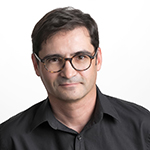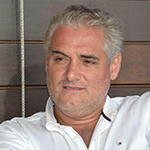The painter of Altamira
The
painter of Altamira (in the darkness of the cave) knows
the shadows he sees on the wall
are real. For him the real and apparent
are indistinct
for he knows the shadows undulating on the wall
are (in fact) bison
passing in front of the cave. Ten thousand years
will have to pass twice
before another bearded man can affirm
something different and in another cave
(by the light of another light) rethink
everything
from the start. But for now they are shadows
(with the profiles of bison) that
the painter of Altamira copies all over the cave –
asking the stone gods that they
may reproduce
so there’s never a shortage of shadows (and
for that matter bison) to hunt
and eat.
O pintor de Altamira
O
pintor de Altamira (na escuridão da caverna) sabe
que as sombras que vê na parede
são reais. Para si são indistintos o
real e o aparente
porque sabe que as sombras que cintilam na parede são
(de facto) de bisontes
que passam defronte à caverna. Será preciso que
passem duas vezes
dez mil anos para que outro homem de barba afirme
coisa diferente e numa outra caverna
(à luz de uma outra luz) pense
tudo
do início. Mas por agora são sombras
(com o recorte de bisontes) que o
pintor de Altamira copia por toda a caverna –
pedindo aos deuses de pedra que elas
se multipliquem
para que nunca faltem sombras (e já
agora bisontes) para caçar
e comer.
The motion of the world
Through the church door I’d hear people’s prayers recited
like someone’s times tables. I wandered the world and
(listen:
it was funny) the more I wandered the more
I had it right (life
itself seemed like it wanted to hold
onto me). In a world gone belly up
bats are the wise ones –
I came back from the world and never admired
the return
(the color of the sea was the same
the light in the sky was the same
envy was exactly the same). Seen top
to bottom
each illusion is small –
through the school window I’d hear times tables recited
like someone’s prayers.
Movimento do mundo
Pela porta da igreja ouvia dizer orações
como quem diz tabuadas. Eu errava pelo mundo e
(escuta:
era engraçado) quanto mais errava mais
estava certo (a
própria vida parecia que me queria
preso a si). Num mundo de pernas para o ar
os sábios são os morcegos –
eu regressava do mundo e nunca estranhava
o regresso
(a cor do mar era a mesma
a luz do céu era a mesma
a inveja era a mesma). Vista de cima
para baixo
toda a ilusão é pequena –
pela janela da escola ouvia dizer tabuadas como
quem diz orações.
Wild apples
More than the first verse I am unsettled
by this: who provides
the second one? I scan the world with my eyelids
(opening and closing my eyes)
to select is to exclude
to exclude is to understand
to understand is to preserve. Each poem written is
an opportunity
like touching someone who without warning
shocks you
(a fish bone in your throat) nails
scratching on a black board. Creating poems is like
stealing
wild apples
(you’re expecting sweetness but what you taste is
acidity). Inside the poem:
sounds
(around them: white space)
silence put to work.
Maçãs selvagens
Mais do que o primeiro verso inquieta-me
o seguinte: o segundo
quem o dá? Escolho o mundo com as pálpebras
(abrindo e fechando os olhos)
escolher é excluir
excluir é entender
entender é preservar. Cada poema escrito é
uma oportunidade
como alguém em quem se toca e sem que se conte
dá choque
(uma espinha na garganta) a unha
num quadro de ardósia. Fazer poemas é como ir
roubar
maçãs selvagens
(vais à espera de doçura mas o provas é
a acidez). Dentro do poema:
sons
(em redor: espaço branco)
silêncio a trabalhar.
Translators’ note:
Professionally, João is a doctor of plastic and reconstructive surgery, and he’s a perfect addition to the long line of physician-poets. His poetry has been published in anthologies and literary magazines in Portugal, Belgium, Brazil, Bulgaria, Croatia, the Dominican Republic, France, Germany, Holland, Italy, Macedonia, Mexico, Montenegro, Spain, the United Kingdom, and the United States (and probably a few more I’m not remembering). He and I were introduced by my mentor, Robert Pinsky, who knew of my ongoing work translating the collected works of the late Alberto de Lacerda. I immediately loved João’s voice: it is inclusive without being pedestrian, and his often-tongue-in-cheek tone is very engaging. He’s also incredibly adept at packing ideas and emotion into a concise poem (almost nothing he writes goes beyond a single page), and the first-person narration puts the reader right in the middle of the action.
These three poems come from Nomad, João’s tenth book, which attests to his popularity and success in his home country of Portugal and abroad. He gave me the opportunity to work alongside Antonio Ladeira to translate the collection, which is an honor in and of itself. We are thrilled for Anomaly to be the first journal to publish part of our work—there is plenty more where this came from.
– Calvin Olsen

Antonio Ladeira was born in Portugal in 1969. He currently lives in Lubbock, Texas, where he is an Associate Professor of Portuguese and Spanish at Texas Tech University. He holds a Licenciatura degree in Portuguese Studies from Nova University in Lisbon, and a PhD in Hispanic Languages and Literatures from the University of California in Santa Barbara. He has published five volumes of his own poetry in Portugal and two books of short stories in Portugal, Brazil and Colombia. He is also a lyricist for Jazz singer Stacey Kent.

Calvin Olsen’s poetry and translations have appeared or are forthcoming in AGNI, Asymptote, The Comstock Review, Ezra Translation, The London Magazine, and The National Poetry Review, among others. A former Robert Pinsky Global Fellow and recent Pushcart Prize nominee, Calvin now lives in North Carolina, where he is a doctoral student in Communication, Rhetoric, & Digital Media and the poetry editor at The Carolina Quarterly. More of his work can be found at his website (www.calvin-olsen.com).

João Luís Barreto Guimarães was born in Porto, Portugal, where he graduated in medicine. He is a breast reconstructive plastic surgeon and author of ten poetry books, the most recent of which are Mediterrâneo (Mediterranean, 2016), winner of Portugal’s António Ramos Rosa Award for Poetry; Nómada (Nomad, 2018), which was voted a Book of the Year by Livraria Bertrand (the oldest bookstore in the world); and O Tempo Avança por Sílabas (Time Advances by Syllables, 2019). He is also a chronicler and a translator, mainly for his blog Poesia & Lda.

 BACK TO ISSUE
BACK TO ISSUE